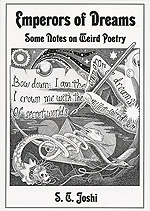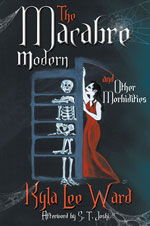Available Now
The Macabre Modern
and Other Morbidities
by Kyla Lee Ward
156 pages
Trade Paperback
PRICE: $16.00 AUD
A contemporary re-envisioning of the medieval “The Dance of Death” theme (fourteenth-century), written for the twenty-first century onward. Fantastic, imaginative poetry written and illustrated by award-winning poet, author, artist, playwright, performer Kyla Lee Ward. Her poem “Revenants of the Antipodes” (in this collection) won the AHWA Australian Shadows Award for poetry 2018. ... [Read more]
Book Catalogue

Emperors of Dreams
Some Notes on Weird Poetry
S. T. Joshi
Item type: Criticism & Commentary
Format: A5 Paperback
Pages: 100
ISBN: 9780980462531
Buy now
Emperors of Dreams - paperback - $15.00 (AUDAustralian Dollars (AUD))
[ADD TO CART]
This handsome paperback edition includes essays by eminent critic and scholar S. T. Joshi on the weird verse of George Sterling, Clark Ashton Smith, H. P. Lovecraft, Samuel Loveman, Donald Wandrei, Frank Belknap Long, as well as a list of contemporary weird poets that includes Richard L. Tierney, Donald Sidney-Fryer, Brett Rutherford, Keith Daniels, Ann Schwader, Alan Gullette, and Australian Leigh Blackmore.
S. T. Joshi is an award-winning Indian American literary critic, scholar, and a leading figure in the study of Howard Phillips Lovecraft and other authors of weird and fantastic fiction.
Contents
by S T Joshi
Reviews
Reviewed by Donald R. Burleson, for Dead Reckonings 4 (Hippocampus Press, 2009)
It seems trite to say that a book fills a niche, but such is the case with S. T. Joshi’s Emperors of Dreams, which one may take to be a sort of literary equivalent of nature’s abhorring a vacuum. The simple fact is that what is here called weird poetry (a term at which one imagines some literary critics cringing, but what better to call it?) has largely fallen through the cracks, over the years, with regard to enjoying serious critical attention. This volume briefly but potently addresses that problem, not just presenting a survey of the weird in verse form from Homer to Bruce Boston but delivering some highly thought-provoking criticism along the way.
Joshi discusses, remarkably for so little protracted a textual format, not only the critical content of the poetry but something of the life circumstances of its creators, pointing out, for example, that George Sterling (who, Joshi says, “has a valid claim for the title of leading American lyric poet of the twentieth century”) was treated in an oddly shabby fashion by H. L . Mencken, who once dissuaded Alfred A. Knopf from publishing a biography of Sterling. Emperors of Dreams provides many such tidbits of obscure but interesting information throughout.
Its greatest appeal, though, is in its critical insights, as when Joshi, discussing Clark Ashton Smith’s The Hashish-Eater, points out the manner in which the use of the pronoun “I” allegorizes the thematics of the text’s narrator’s metamorphosis from an “emperor of dreams” to a helpless victim of his own fantastic visions. The text’s early uses of “I” occur near the ends of poetic lines, “where the enjambment creates a dynamic sense of the narrator’s power,” with later syntax diminishing that power. This critical insight is in the best tradition, genuinely conducing to enhanced understanding of a problematic text.
Joshi correctly assesses Lovecraft as a fiction writer who never quite found his own voice as a poet, but points out something easy to miss: that Lovecraft’s earliest articulations of cosmicism appear not in a short story but in verse, in “The Poe-et’s Nightmare.” He also interestingly characterizes the Fungi from Yuggoth sonnets as “a sort of versified commonplace book,” in contradistinction to attempts to see them as possessing a more coherent structure.
Both expressly and by implication, Joshi makes it clear that “weird poetry” is not just frisson in verse, as shown by an examination of the works of three other notable figures in terms of their thematic significance. Samuel Loveman was essentially a sort of neo-pagan whose verse laments the passing of the pre-Christian world; indeed The Hermaphrodite, amusingly enough, caused quite a stir among some of amateur pressdom’s Bible thumpers. Donald Wandrei’s poetic expression of the pervasive theme “beauty must die” and Frank Belknap Long’s ongoing prosodic search for enchanted realms beyond the common world, do much to illuminate the fact that weird verse is no shallow vulgarization of “real” verse, but is real verse that dares to explore unusual and even cosmic themes and settings—most effectively, Joshi argues, when it does so by way of traditional meters and structures. Emperors of Dreams is a valuable and perceptive study of a worthy subject about which astonishingly little had been written before.
Reviewed by Gary William Crawford (Gothicpt12@aol.com), for Star*Line
No one can deny that S. T. Joshi is the pre-eminent scholar and critic of weird literature. His enormous amount of work is of consistently high quality, and this book is no exception. Joshi is aware and says that he bases his study on the work of Steve Eng, who is indeed a ground-breaking critic and bibliographer in the field. Eng, who is no longer writing due to acute Alzheimer’s disease, wrote the chapter, “The Supernatural in Verse,” in the book Horror Literature: A Core Collection and Reference Guide, edited by Marshall B. Tymn in 1981.
Joshi’s new book, Emperors of Dreams, is an incisive study of this ancient branch of literature that continues to survive today. Beginning with a fine overview of the genre from its beginnings, Joshi mentions the most important contributors to the field ending with poets such as Richard L. Tierney, Joseph Payne Brennan, and Bruce Boston. He admits that he is highly selective and is prejudiced to versifiers who write in rhyme and meter.
The bulk of Joshi’s book is devoted to individual essays on twentieth century weird poets. He begins with George Sterling, whom Joshi notes is more well-known for the writers he knew than for his poetry. But he champions this author and sets forth the themes with which he is concerned, specifically his meditations on human transience. He moves to a chapter on Clark Ashton Smith, whom he regards as the greatest writer of fantasy poetry in the twentieth century. However, he admits that he will probably not be esteemed by mainstream critics. Joshi follows Smith with an essay on Lovecraft, but regards the bulk of his poetry as ephemeral juvenilia. He does point out that Lovecraft’s achievement in poetry rests on the sonnet cycle Fungi from Yuggoth, as it chrystalizes the concerns of his fiction.
The poet Samuel Loveman, Joshi points out, was as diffident as Lovecraft for seeking publication venues for his work, and says that his work is mainly from his early life as a writer in the amateur press associations, or APA’s, as they are sometimes called. But he places Loveman as even better than Lovecraft and as a rival of Smith. Like Loveman, Donald Wandrei is a poet of his youth and contends that it is his “flawlessly chiseled” poetry for which he will be remembered. Similar to Wandrei is the poetry of Frank Belknap Long, whose collections In Mayan Splendor and The Darkling Tide are the publications that collect this bard of youth.
A concluding chapter on selected poets of the past thirty or forty years points out some of the major writers of today. Left out is the poetry of Bruce Boston (briefly mentioned in the first chapter) and many poets writing in these years. Two pages are devoted to Tierney, a few to Donald Sidney-Fryer, two to the late Keith Allen Daniels, and one to Ann K. Schwader. Mentioned are Australian poets Leigh Blackmore, Phillip A. Ellis, and Charles Lovecraft.
As a whole, Joshi’s incisive remarks and analyses give a true and vivid picture of weird and fantastic poetry and points the way to further study. I can think of any number of poets left out, but Joshi has laid the groundwork for a study of this vast and important field. I recommend it to all fantasy poets and poetry scholars working today.
Reviewed by Leigh Blackmore, at Sword and Sorcery Weird Fiction Terminus (Amateur Press Association)
http://sswftapa.blogspot.com/2008/12/prea-press-publishes-st-joshis-emperors.html
Reviewed by Scott Green, for Green Genre Poetry Blogspot
http://greengenrepoetry.blogspot.com/2010/05/three-more-book-reviews.html

